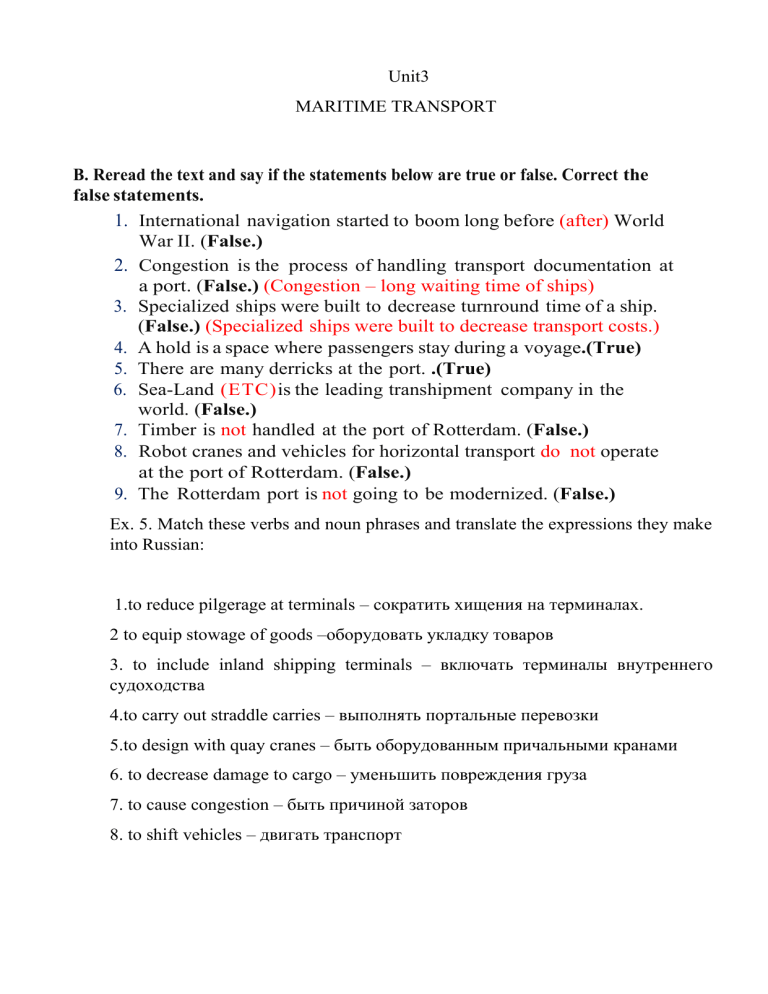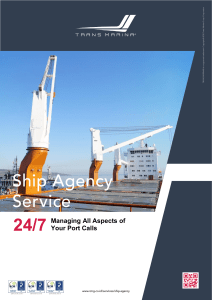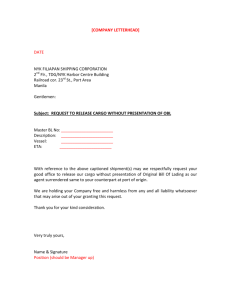
Unit3 MARITIME TRANSPORT B. Reread the text and say if the statements below are true or false. Correct the false statements. 1. International navigation started to boom long before (after) World War II. (False.) 2. Congestion is the process of handling transport documentation at a port. (False.) (Congestion – long waiting time of ships) 3. Specialized ships were built to decrease turnround time of a ship. (False.) (Specialized ships were built to decrease transport costs.) 4. A hold is a space where passengers stay during a voyage.(True) 5. There are many derricks at the port. .(True) 6. Sea-Land (ETC)is the leading transhipment company in the world. (False.) 7. Timber is not handled at the port of Rotterdam. (False.) 8. Robot cranes and vehicles for horizontal transport do not operate at the port of Rotterdam. (False.) 9. The Rotterdam port is not going to be modernized. (False.) Ex. 5. Match these verbs and noun phrases and translate the expressions they make into Russian: 1.to reduce pilgerage at terminals – сократить хищения на терминалах. 2 to equip stowage of goods –оборудовать укладку товаров 3. to include inland shipping terminals – включать терминалы внутреннего судоходства 4.to carry out straddle carries – выполнять портальные перевозки 5.to design with quay cranes – быть оборудованным причальными кранами 6. to decrease damage to cargo – уменьшить повреждения груза 7. to cause congestion – быть причиной заторов 8. to shift vehicles – двигать транспорт Ex. 6. Fill in the gaps with the words given below. A. damage, trucks, transported, insures, transit, insurance, transportation, covered, shipment Goods can also be transported by sea, by a shipping company. If the goods are shipped, then transportation, must be arranged from the factory to the docks (or a quay). This can either be by road in trucks _ or ( lorries) or by rail. The shipment must be insured (covered) against loss or damage in transit (while being, transported). Sometimes the exporter takes out insurance, and sometimes the importer insures the shipment depending on the terms of their agreement. If the goods are damaged in transit, the company is covered by the insurance. B. freight, cargo, shipping, transit, charges/costs, docks Someone hasto payforall these things .While goodsarein transit , they are called freight (or cargo), so the company pays cargo rates (or freight costs) to the shipping company. The shipping is loaded at the docks ,and for this the company pays handling charges. Also the company must pay packaging charges/costs . Ex. 7. Complete the sentences choosing the right word and changing its form if necessary. I. Their (sharing, division) in container service is not big. 2. They (divide, share) cash between the participants. 3. The road (is divided, share) at this point, and we must take the leftturning. 4. The capital of the company (is shared, divide) between three people,and each received his (share, division). 5. I don't want (to share, divide) a room with anyone. 6. We'll (divide, share) the travelling expenses with you. 7. We are (accepting, receive) French forwarders tomorrow, and we havea good (reason, cause) to be in a hurry. 8. Have they (receive, accepted) our prices? - If they haven't, try to findout the (cause, reason). 9. They didn't (accept, receive) our invoice yesterday. 10. The Sellers (have received, accept) FOB terms, and we are going to signa contract tomorrow. Ex. 14. Complete the sentences using correct tense and voice forms of the verb. 1. RonCon has been (manufacturing) containers since 1980. Their containers were(used) by many transport operators last year. 2. Our department had been (developing) robot cranes since we first (saw) them atthe exhibition Logistics and Transport-20... 3. Ten containers are (shifted) in one go at the port of St Petersburg. 4. They have been (packing) chemicals for 2 hours, I think everything will be (packed) tomorrow. 5. Did Anyone (call) me yesterday? - No, there (was) a fax for you to arrange insurance of the consignment for Chicago. 6. The tyres have been(taken ) over at the port by our freight forwarders. 7. The warehouse is (equiped) with up-to-date cranes (designed) by theDutch manufactures. 8. The delay in delivery of the equipment is (caused) by the congestion in the port. 9. Transport costs will (decrease) if port equipment is (modernized). 10. Have You (arranged) unloading? - Certainly, in fact the vessel i s b e i n g (unloaded )now. It will have been(completed) in three hours. Ex. 15. Put in prepositions where necessary and translate the sentences into Russian. 1. The damage occurred during transit is being discussed now. 1. He says that the freight forwarders will take the port by loading. 2. I don't share your point of view of opment of transport delay the future devel­ in Russia. 3. There were serious congestions in which caused the goods to the port inNovorossiysk, during discharge. 4. The warehouses are not equipped with up-to-date cranes so far, that is why loading takes much time and causes delays. 5. Who's arranged their visit at them nanufacturing plant? the invitation from our Board of Directors. -They arrived 6. The new terminal will be specially equipped for handling tim­ ber. The process of reconstruction is not completed yet. 7. The transport documentation will be handled by the forward­ ers on behalf of the manufacturers. 8. The cargo was sent to the port 9. The goods have been packed warehouse and sent to by road. Into two containers In our the port . B. P.69 Listen to the conversation again and say if the statements below are true or false. Correct the false statements. 1. Mr Semenov(Mr. Brockett) is the General Manager of a tyre factory.(False) 2. The tyres for Briansk were sold on CIF terms.(True) 3. Freight forwarders (Mr Semenov) was dealing with the packing of tyres. .(False) 4. The consignment of tyres was not insured. .(True) 5. The manufacturing plant did not need(needed) any copy of the Bill of Lad1• ng. .(False) 6. The General Manager was not very busy. .(False) B.p.72 Read the letter again and say what the letter says about a) the exhibition in Cologne; b) the problems which will be discussed at the conference; c) the equipment to be on display at the exhibition.

